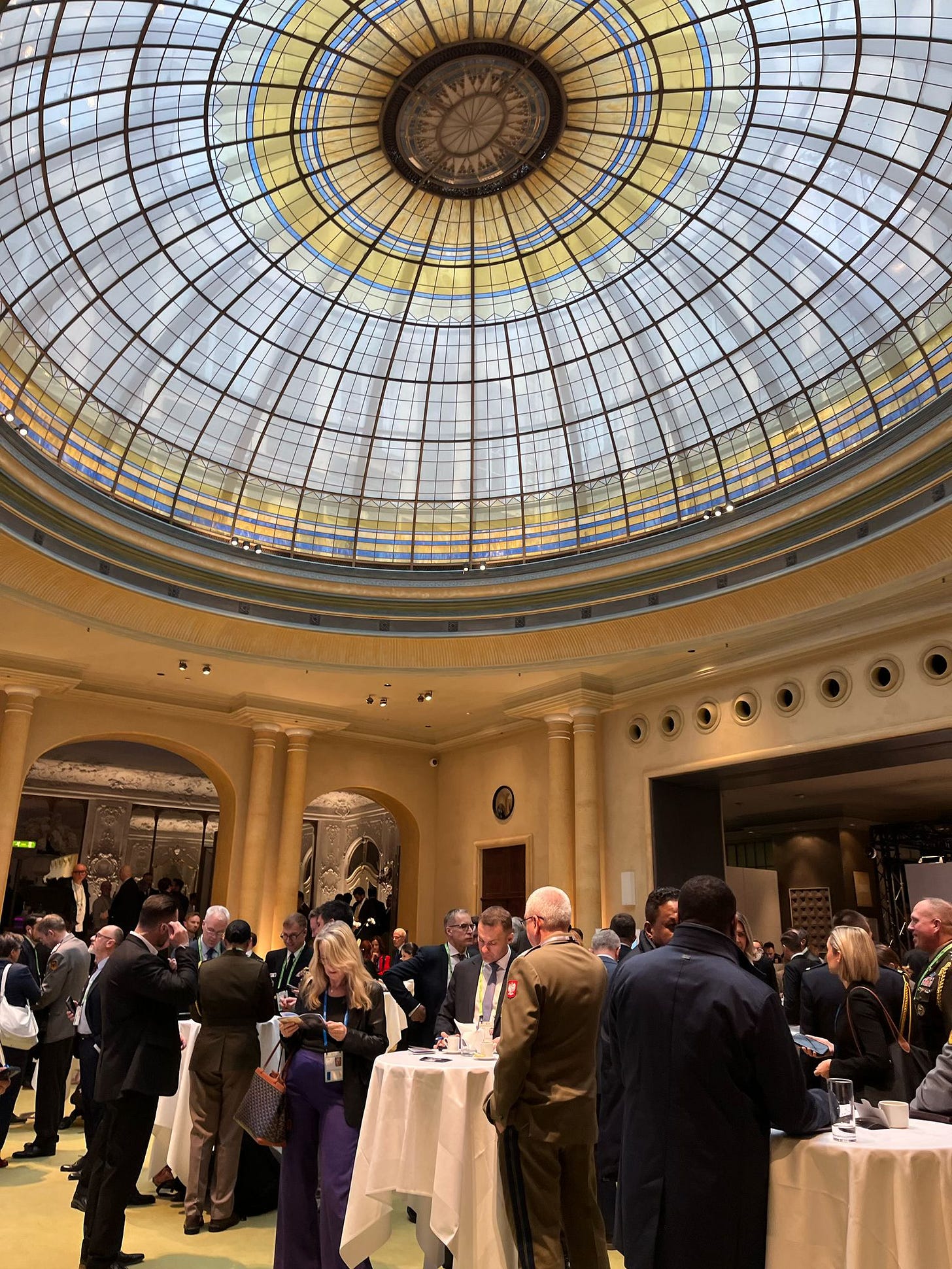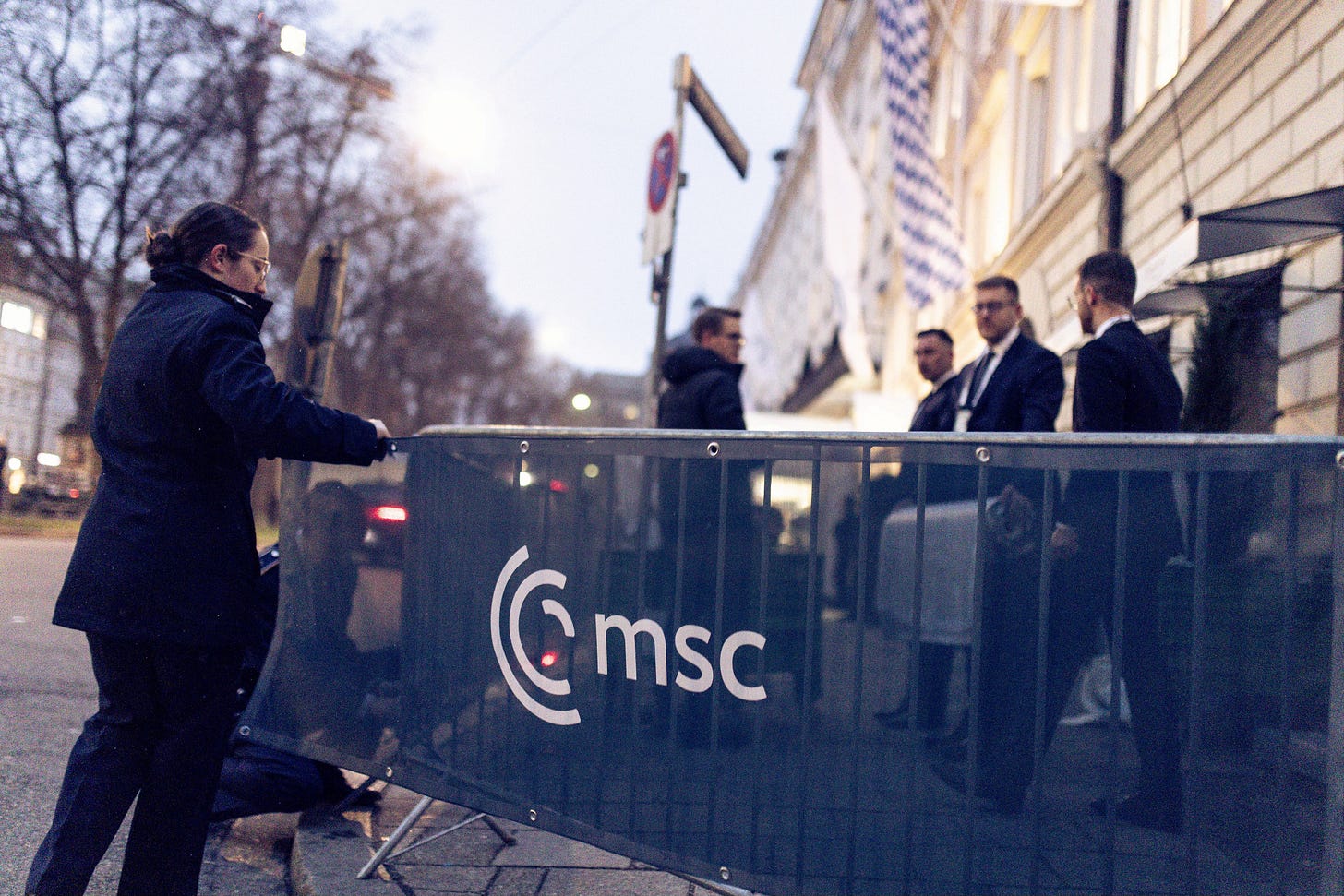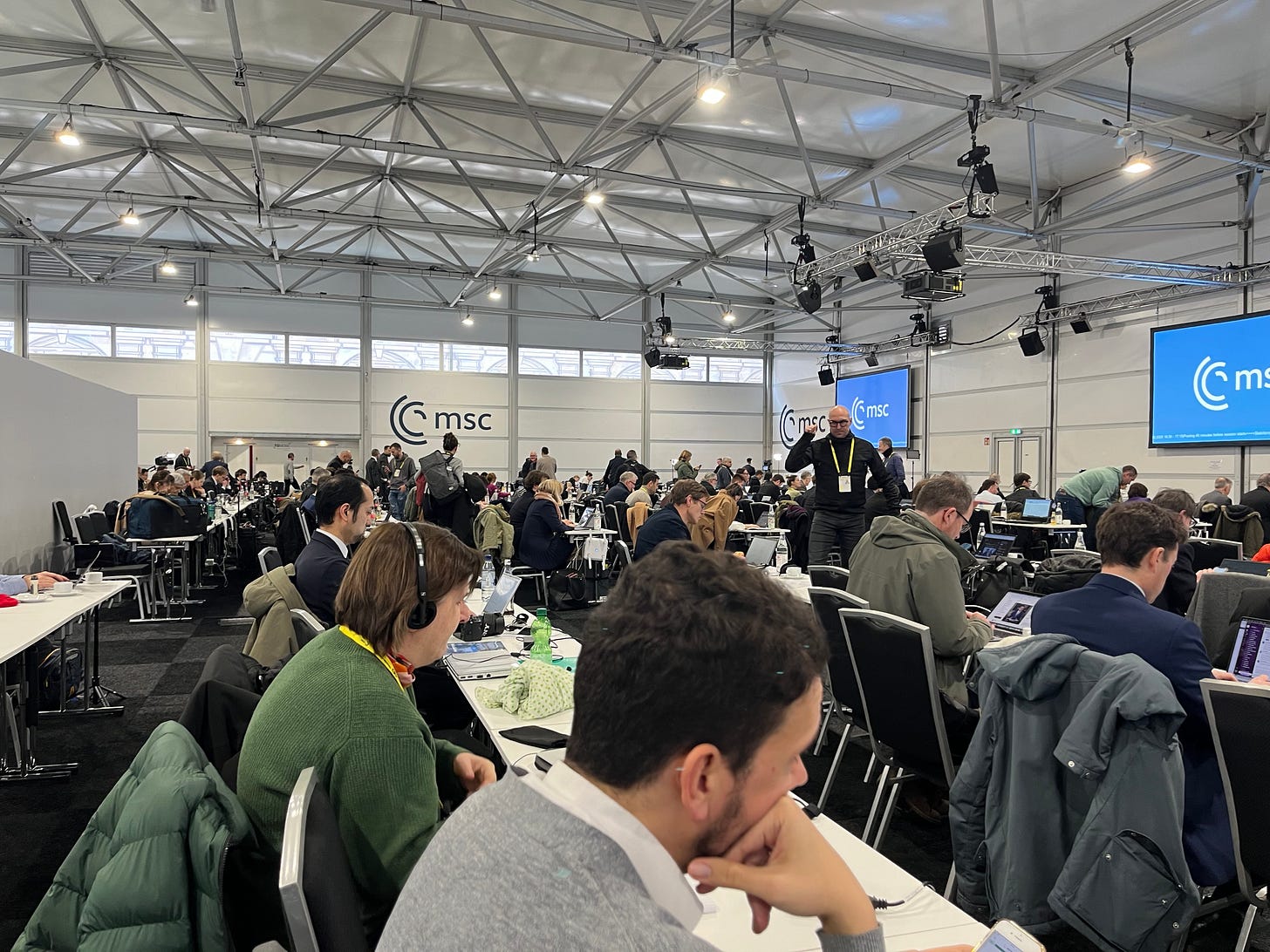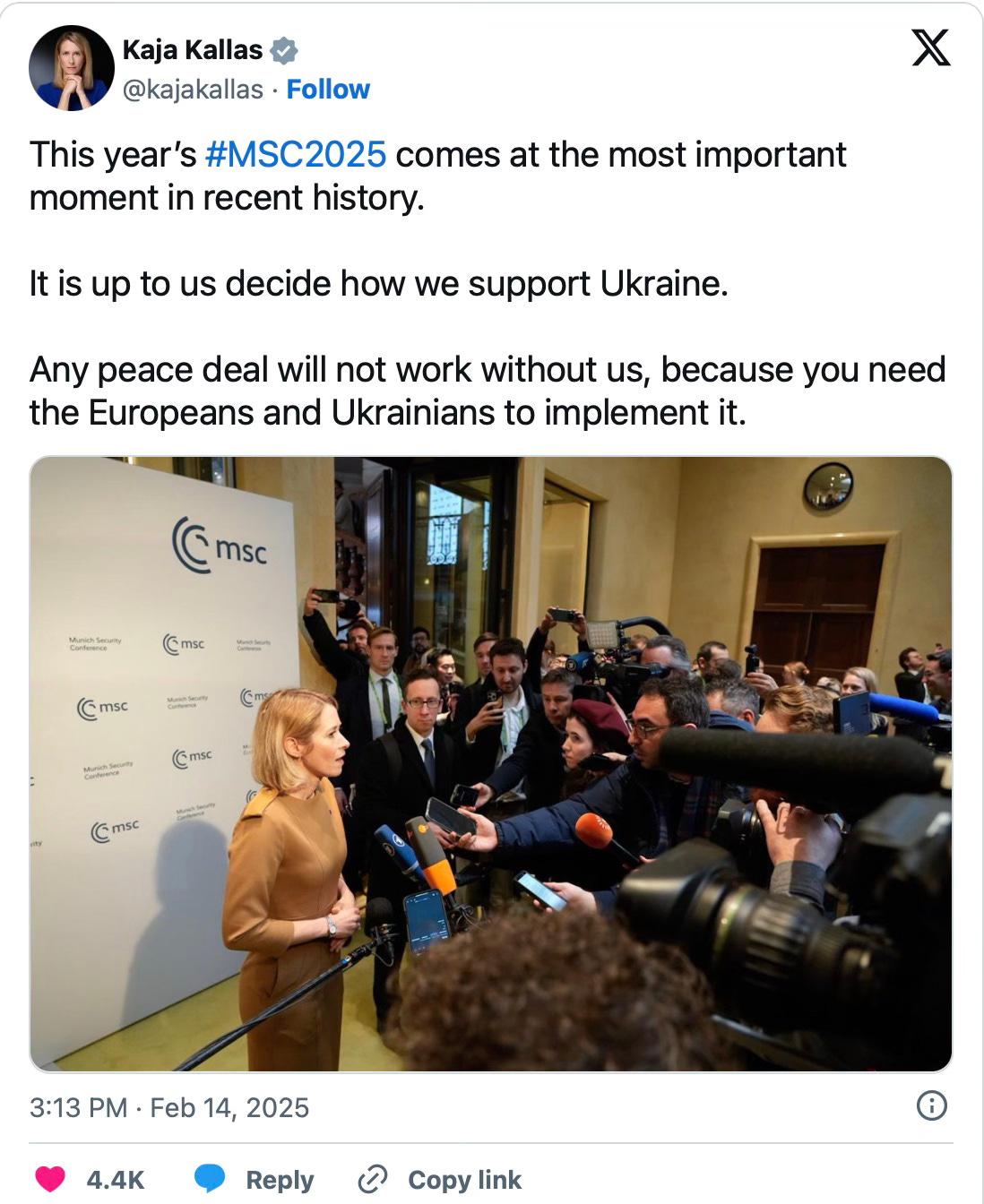A Journalist's-Eye View of the Munich Security Conference
50 heads of state, 150 ministers, and hundreds of experts and journalists. Here's an insider's view of what it is like to report from the world's largest gathering of political and military leaders.
“Are you going to ask the Minister a question?” asked the cameraman to my right.
“Hopefully,” I said, checking the list of questions in my notebook. I had prepared a dozen that would work for any European or military leader I happened to talk to and was working out how to tailor them to each interviewee.
“That’s good,” he said in a thick German accent. “If he looks at you, I’ll get a great picture.”
We were standing, fingers turning blue, at the barricade of the grand Hotel Beyerischer Hof in central Munich, waiting for German Defense Minister Boris Pistorius to answer our questions. That morning saw a layer of snow coat the story-book peaked roofs and cobbled streets of the city, turning the air as cold as relations between Washington and Europe appeared to be turning
This is not an article about the conference’s agenda. I have already written about that and there are plenty of excellent analyses you can find. Rather, I wanted to write about what it is like to be a reporter at such a momentous global event and take you through the quick thinking we have to do to bring you stories. Transparency matters in our industry, as does teaching the next generation of reporters and editors.
My student journalism days involved plenty of on the ground reporting, many of which involved sensitive conversations with sources or interviews with international leaders. But Munich was my first global summit; the first time I was at the scene of events that could shape millions of lives for decades to come.
I don’t know if it’s possible to have an entry-level international summit. Thankfully, in my experience, journalists are happy to share advice. A few weeks ago I met a renowned defense journalist and asked him what I could expect and what I should do to get the most out of it. His advice was invaluable and formed the backbone of my strategy.
Any hope that I could freely wander the corridors of the Beyerischer Hof speaking to diplomats and officers was snuffed out. Only a handful of heavyweight outlets have that kind of access (not unlike reporting from the White House). The rest of us require an escort to enter any building outside the press conference studio and the press centre, a temporary structure erected in a courtyard of the colossal Residenz Palace a short walk from the hotel.
The MSC takes good care of its journalists. They booked-out a cozy restaurant to provide us with a three meals a day of warm, energy-dense Bavarian food. The media centre was well equipped with recording booths, big screens showing the main speeches, and a constantly trafficked refreshment desk of hot drinks, juice and pretzels. Camera crews recording pieces to camera lined the aisles between rows of desks that I reckon could have seated around five hundred editors, producers and writers.
It was a hub of activity but I was advised to spend as little time there as I could. Yes, global headlines would be made on the main stage but we could get our coverage from a wire service. What we could not outsource, and I was in Munich to get, were the fascinating conversations that take place when you combine the world’s political, military, legal and academic elite in one place.
That required planning. I reached out think tank contacts I had amassed over the past two years asking if I could join any side-events they might host, and arranged an escort from the helpful cadets who made up the media operations team. Every morning I checked through the daily press agenda for any opportunities to go to press conferences or doorstep interviews. I was constantly on my feet, often typing up articles and checking interview transcripts on my phone as I dashed between venues.
A doorstep interview with Kaja Kallas on Friday morning proved my first real success. These sessions are first-come-first-served and I suspected I would not be the only person keen to talk to the EU’s top diplomat. So I set out to the reception point early, factoring in time to get through security.
While I waited I squatted in a corner of the pooling centre, updating up my little book of questions and google doc of spare paragraphs. Journalists covering breaking news often write a portion of their article in advance, either predicting likely outcomes or preparing a few lines to add context to a story.
My planning paid off. Nobody taught me how to handle a doorstep press conference. They’re less sedate than sit-down conferences, where everyone has a seat and raises their hands like they’re in an especially persistent school assembly. But I have seen enough clips on the news to have an idea what I was getting into.

We were brought to a corner of the hotel’s warmly lit atrium. I was excited to be in the heart of the conference so early, having almost given up hope of getting inside at all. The crowd around me was a kaleidoscope of glinting cufflinks peeking from under sharp suits and loops of gold braid or rows of ribbons attached to precisely pressed uniforms.
But I could not let myself become hypnotized by the crowd. I knew I had to get close to the front as I could and root myself to the spot. That’s easier said than done if you’re as slight as I am. After getting pushed around I accepted a less than comfortable position wedged between two muscular cameramen whose harnesses threatened to smack me on the head if they whipped around too quickly. But I was at the front, not too far from the centre, where I wanted to be.
The best case scenario for these events is that you only have time for one question. So it had better be a good one. I settled on whether the inconsistent statements from Trump, Vance and Hegseth over what was on the table for negotiations over Ukraine’s future put the Kremlin in a stronger negotiating position. While we waited I rehearsed what I was going to say over and over in my mind. This wasn’t an academic conference where I could ask a longwinded question that requires a full minute of explanation. Realistically, I’d have ten seconds. I needed to be slick.
As Kallas took her position, journalists extended microphones on gyroscopic arms and I wished I had one of my own. I also had a mic but I didn’t want to risk a technical failure if the bluetooth connection failed. So I craned forward, stretching my arm out as far as it would go and prayed that she wouldn’t be drowned out by the chatter in the atrium.
“Mrs Kallas!” we all shouted.
There was no pre-determined order at which she would take our questions. Her assistant picked us out one by one. I kept trying to make eye contact with him. Nobody has asked my question, or the backup I had memorized just incase. But each time someone else spoke, my chances became more remote.
Then, her assistant looked at me directly. “You’re next,” he mouthed.
Suddenly, I couldn’t hear the noise behind me. All I was aware of was Kallas looking at me, barely an inch from the end of my phone, and my carefully annunciated question.
“Thank you.”
I had my quote! I texted my editor triumphantly and sent her the file to transcribe while the press pack was moved on to our appointment with Pistorius. Reporting is addictive, a cycle of dopamine hits that spur you to chase your next story and catch the satisfaction of getting it published. I felt like a dog that was elated to do the job it was bred for. I was doing exactly what I was supposed to.
I’m lucky that I am very good at recognizing people. A few other reporters at the conference told me they have the same gift: once I have put a name to a face I find them hard to forget.
Munich is like the Oscars for geopolitics. At any moment John Kerry can waft past you as smoothly as a man can while being flanked by a protection squad. I waited for a lift next to Anne Applebaum, who was fresh from listening to J.D. Vance’s speech and appeared to be composing her next op-ed through conversation. In the flood of people spilling out of the main hall I was buffeted into the golem-like chest of Wladimir Klitschko, the champion heavyweight boxer and close companion of his boxer-turned politician brother Vitaliy.
I caught Vitaliy — the Mayor of Kyiv — the next day outside the Ukrainian Lunch. I slipped into the crowd of journalists clustered in front of him and thrust my phone under his chin, hoping he would notice me. I got my quote!
You have to seize every opportunity to talk to these people as they arise. At one point I ended up in a lift with General Petraeus and spoke with him until the doors opened and he was called away to a Ukrainian broadcaster.
Frustratingly, that wasn’t always possible, On the first day, while being led out of the building with a crowd of other journalists, I spotted Russia-expert Fiona Hill out of the corner of my eye and spun on my heel to introduce myself but my escorts kept us moving.
Generally, everybody was happy to talk to me. There were a few occasions when a politician I trotted alongside for a hundred meters as they crossed the street politely turned me down because they were busy.
I introduced myself to just about everybody I stood next to. I have become adept at quickly explaining that my employer is banned in Russia for our reporting of the war when introducing myself as working for “The Moscow Times” inevitably raises eyebrows. But we’re a known entity in geopolitical circles. My handshake was often met with a broad grin and fond recollections of reading “TMT” when they studied in Moscow, or even writing restaurant reviews in our early days during the “wild” nineties.
Often, conversations with people who will never make the headlines were the most valuable parts of my conference. They are the people who will tell you what is really going on under the surface or can give you the most detailed analysis. They were often as curious about my work as I was about theirs.
I had high hopes but my experience at Munich proved to be even more rewarding than I expected. I reaped the benefits of my careful preparation and found myself at closed-door events with critical global decision makers discussing European security. One evening I turned up at a side-event I’d arranged access and found that it was an intimate dinner where I could converse with experts on Russian illicit activities and mercenaries in Africa. I’d leave these events with my arms laden with reports, pockets stuffed with business cards, and new ideas and understanding racing across my mind.
Another joy came from my fellow journalists, who were a group of interesting and knowledgeable people with an infectious drive.
There is competition within the press pack — everybody wants to get their quote — but journalism is ultimately collaborative. Everyone quote you get (or perhaps even a document or two) is a cell that makes up the organism of the story.
There is also a strong culture of mentorship. A Swiss journalist who had been going to Munich for years took me under her wing and taught me some of the ways that journalists can mingle with delegates without an escort. I also met a veteran of the NYT who had reported from over 100 countries, many of which no longer exist. I asked him for career advice after we discussed the latest comments from Trump’s envoy to Russia and Ukraine. “Keep doing what you’re doing,” he said warmly and I felt like I was walking on a cloud.
And then there are the familiar, friendly faces who smile at you in the corridor or excitedly swap anecdotes between meetings. The night before the conference I went for a drink with a reporter I’d met at Chatham House a month earlier. I also struck up a friendship with a journalist from DC who writes one of my favorite geopolitics newsletters. I kept bumping into her (she proved impossible to miss with her hair that reminded me of Billie Eilish’s vintage pin-up era) and we would keep the stinging cold at bay by making each other laugh between our appointments.
I hope it doesn’t sound glib to say how much I enjoyed myself, considering how many lives are at stake. I’d collapse into bed at the end of each day with my feet aching (being on your feet all day can make even the most worn-in brogues chafe) and my brain fizzing from information overload. I’d enter my newly gathered clutch of business cards into my contacts and update my book of questions with inspiration from that evening’s newsletters.
The past weeks of headlines have spun past with bewildering speed, often contradicting the preceding day or even common sense itself. I can’t switch off from it. Nor do I particularly want to, though I don’t recommend being this way. There’s an in-joke among reporters that we are chronically incapable of taking time off, even when it affects our mental health, and we channel our information addiction into our work. There is some truth to that. But as stimulating as reporting on breaking news can be, it is also therapeutic. When the world feels chaotic, being able to talk to people at the centre of the action and serve the public buy getting important information out makes you feel a little less powerless.







